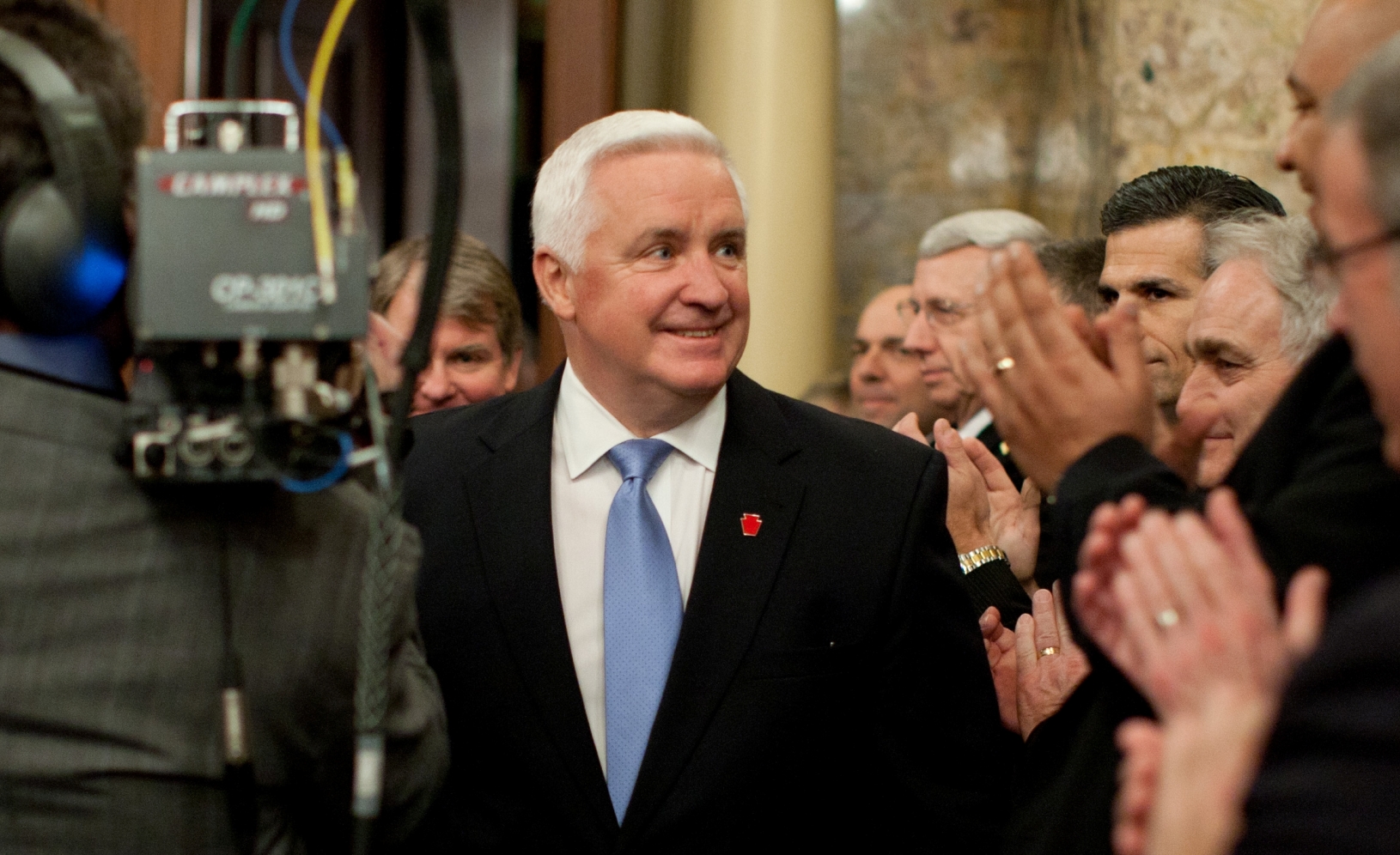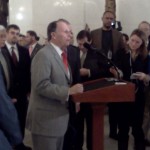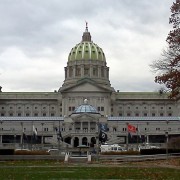Posts
Governor Tom Corbett on funding for transportation
/in Ask the Governor, Media, News, Video /by PAMattersGovernot Tom Corbett on funding for higher education
/in Ask the Governor, Media, News, Video /by PAMattersGov’s Basic Ed. Budget Plans Already Being Debated
/in News /by PAMattersPennsylvania policymakers still aren’t on the same page when it comes to the current fiscal year’s public schools budget, let alone Governor Tom Corbett’s newly proposed education spending plan. For instance, Governor Tom Corbett made it a point to stress that basic education funding was not cut in June.
“When the Obama Administration handed states billions of dollars in stimulus monies, the previous administration reduced the state’s share in the Basic Education funding formula. In its place, they put the stimulus funds. Almost a billion dollars worth,” Corbett said during Tuesday’s budget address. “That money is gone. It’s not coming back.”
As for his new spending plan, Corbett says there are no cuts to the basic education funding formula. “In fact you will find a slight increase, just as we did last year,” Corbett said to a partisan applause from lawmakers gathered in joint session.
Corbett’s new education budget does have a new look however, as the Basic Education Funding, Pupil Transportation, Nonpublic and Charter Transportation and Social Security line items have all been lumped into a $6.5-billion dollar block grant.
“We’ve heard for years that local school districts needed more flexibility,” says House Republican Appropriations Chair Bill Adolph (R-Delaware). “I think what the governor has laid out today… will give the school districts this type of flexibility. Sometimes they may not need all of that money in transportation, and can put it into the classroom.”
But House Democratic Appropriations Chair Joe Markosek (D-Westmoreland) is wary of the block grant approach, and he’s identified $124-million dollars in cuts to education programs. “I think most school directors would tell you they will have less money to spend, in spite of what the governor has said,” Markosek tells us.
He’s referring primarily to the elimination of something called the Accountability Block Grant, which received $100-million dollars in the current fiscal year. It’s a program that primarily helps to fund full-day kindergarten classes across the commonwealth.
While Governor Tom Corbett’s new approach to education is being interpreted in different ways, there’s not debating the challenges created by a different education line item. The state’s contribution to the Public School Employees’ Retirement System is slotted for a $315-million dollar (53%) increase in FY2013.
Governor Tom Corbett Proposes $27.139 Billion Budget
/in News /by Brad ChristmanGovernor Tom Corbett has unveiled his budget proposal for the 2012-13 fiscal year. The $27.1 billion spending plan comes in $10 million under the current year’s actual budget and represents what the governor calls a realistic budget in difficult times.
Prior to the Governor’s speech to a joint session of the General Assembly, state Budget Secretary Charles Zogby reported that the projected revenue shortfall for the current fiscal year is up to $719 million, putting more pressure on the governor and lawmakers who will have to craft the next budget.
While basic education would see a slight increase in its General Fund subsidy, it would all but hold the line from last year’s overall number. The governor took the opportunity during his address to chastise political opponents, saying they misrepresented his education budget last year. The governor says he raised basic ed funding, but the evaporation of federal stimulus dollars results in an overall decrease in spending.
Governor Corbett is proposing more deep cuts to higher education, which last year was slashed by about 20%. This year, the 14 state-owned universities would see their state funding slashed by another 20% under the governor’s plan. Meanwhile, three of the four state-related universities – Penn State, PITT and Temple – would average 30% cuts. Lincoln University would receive the same funding level as last year. Governor Corbett also announced the formation of a special panel to examine the way higher education is funded in Pennsylvania. He has appointed former state Senator Rob Wonderling to head that committee and report back in November.
Next up in the state budget process: weeks of budget hearings in Harrisburg, then lawmakers will try to iron out a final spending plan that will be brought to the floors of the House and Senate by June 30th.
Gov. Taps Task Force to Reduce Prison Costs
/in News /by PAMattersThe new Justice Reinvestment Initiative panel will be tasked with helping to reduce the crime rate, decrease recidivism and lower corrections costs. Corrections Secretary John Wetzel says the goals are all connected. “We know with better outcomes we have less people coming back. With less people coming back, that means they’re not screwing up when they’re out. We’ll continue to focus on improving public safety by delivering better outcomes, and – by the way – we’re going to save money doing that.”
Secretary Wetzel will lead the new task force alongside Pennsylvania Commission on Crime and Delinquency Chair Mark Zimmer.
The group convened for the first time at the Governor’s Residence this week. “Education, corrections and welfare take up about 95% of the budget pie,” Governor Tom Corbett told them. Governor Corbett will deliver his second budget address on February 7th.
Between 2000 and 2010, Pennsylvania’s prison population grew by 40% to more than 51,000 inmates. Over that same time period, Department of Corrections spending increased by 76% to $1.9-billion.
Rendell calls on Corbett to Reverse Proposed Asset Test for Food Stamps
/in News /by PAMattersFormer Governor Ed Rendell has hand delivered a letter to the office of Governor Corbett, asking him to cancel plans to renew an asset test for food stamp recipients. At a news conference on Wednesday, Rendell says the test that would eliminate people from the Supplemental Nutrition Assistance Program based on their personal assets is unnecessary, since there’s already federally mandated means testing.
The Rendell administration ended asset testing in 2008. The former governor says returning to the practice would not produce any savings and would hurt thousands of households. Rendell says there’s no need for this test to get rid of fraud, waste and abuse, because Pennsylvania has one of the best accuracy rates of any state in the union.
Rendell says there wouldn’t be any savings, because the state would have to notify SNAP recipients of the change in policy and retrain all of the county assistance office staff. He says there’s also the economic impact, the loss of federal food stamp money that Pennsylvanians would no longer have to spend in grocery stores.
Rendell says he’s known Tom Corbett for a long time and believes him to be a good, decent man who cares about Pennsylvanians. He’s asking the Governor in good faith to take a look at the policy and reconsider.
Representative Michael Gerber (D-Montgomery) says families would be forced to make tough decisions if this asset test is reinstated. He calls it pennywise and pound foolish because any scarce savings would be far outweighed by any economic harm that it will do.
Kendall Hanna, of the Central PA Food Bank, says the asset test would make it nearly impossible for many people who have been recently laid off to obtain any help through the food stamp program. He says a family would be penalized for saving money for medical emergencies or to repair their car to get to work.
Hanna says the asset test would drive thousands and thousands of people to food pantries and churches already stressed by a 40% increase in the number of people seeking food assistance just in the last four years.
Kevin Harley, spokesman for Governor Tom Corbett, says the number of people in Pennsylvania receiving food stamps nearly doubled while Governor Rendell was in office. He disputed claims the asset test would lead to more administrative costs. He says when people would come in for renewals; they’d sit down with a caseworker who’d go over their assets.
Harley says the Corbett administration wants to make sure that the people who truly need to receive food stamps can get them. He says the administration is still working on setting asset limits.
Harley also responded to concerns the state would lose millions in federal food stamp money due to the change. He says that’s saying Pennsylvania needs to generate more food stamps to have a poverty industry. He says the Corbett administration is trying to create an economic environment where the private sector can grow and create more jobs, so that more people won’t need food stamps.
Governor Tom Corbett answers listener email 2
/in Ask the Governor, Media, News, Video /by PAMattersGovernor Tom Corbett on Honest Appalachia
/1 Comment/in Ask the Governor, Media, News, Video /by PAMattersWelcome to PAMatters.com, a new source for news and commentary from Pennsylvania’s capital. In addition to video, audio and pictures from the stories and events that affect YOU, you’ll also get some behind-the-scenes analysis via blogs from our award-winning staff of journalists.








